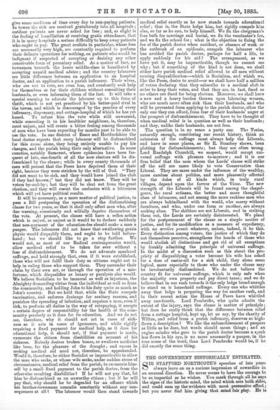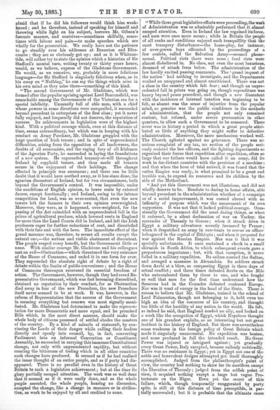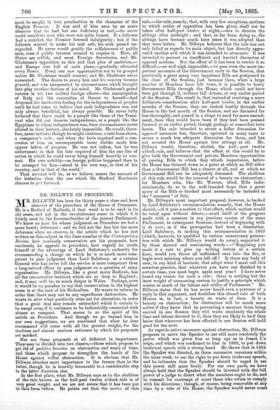THE GOVERNMENT HISTORICALLY ESTIMATED.
SIR STAFFORD NORTHCOTE'S speeches of late years always leave on us a curious impression of cowardice in an unusual direction. He never seems to have the courage to be as impartial as he wishes. You mark through all he says the signs of the historic mind, the mind which sees both sides, and could sum up the-evidence with most persuasive effect ; but you never find him giving that mind fair play. He is afraid that if he did his followers would think him weakkneed ; and he therefore, instead of speaking for himself and throwing white light on his subject, borrows Mr. Gibson's forensic manner, and contrives—sometimes skilfully, sometimes with labour and pain—to make speeches which are wholly for the prosecution. We really have not the patience to go steadily over his addresses at Braunton and Ilfracombe ; they are so obviously got up ; and as it is Whitsuntide, will rather try to state the opinion which a historian of Sir Stafford's mental turn, writing twenty or thirty years hence, would, as we believe, express of the Gladstone Government. He would, as we conceive, say, probably in more felicitous language—for Sir Stafford is singularly felicitous when, as in his essay on "Nothing," he can say the things which arise in his own mind as they arise there—something of this kind.
"The second Government of Mr. Gladstone, which was formed after the popular uprising against Lord Beaconsfield, was remarkable among the Governments of the Victorian era for a special infelicity. Unusually full of able men, with a chief whose powers in some directions were unequalled, it succeeded beyond precedent in enterprises of the first class ; yet it never fully enjoyed, and frequently did not deserve, the reputation of success. Its achievements in legislation were of the highest kind. With a political courage which, even at this distance of time, seems extraordinary, but which was in keeping with his conduct on Army Purchase, Mr. Gladstone grappled with the huge question of Irish tenure ; and in spite of unprecedented difficulties, arising from the opposition of all landowners, the doubts of all economists, and the raging fury of all Irishmen of the Agrarian Party, he succeeded in laying the foundations of a new system. He superseded tenancy-at-will throughout Ireland by copyhold tenure, and thus made all tenants secure in the enjoyment of their holdings. The change effected in principle was enormous ; and there can be little doubt that it would have soothed away, as it has since done, the agrarian discontent of Ireland, but for two circumstances, both beyond the Government's control. It was impossible, under the conditions of English opinion, to lower rents by external decree, except fractionally ; and Ireland, owing to the intense competition for land, was so over-rented, that even the new tenure left the farmers in their own opinion overweighted. Moreover, they were, as it happened, over-weighted, for the passing of the Act coincided with an unprecedented fall in the prices of agricultural produce, which lowered rents in England far more than the Land Courts did in Ireland, and left the Irish producers eager for further reductions of rent, and dissatisfied with their fate and with the laws. The immediate effect of the grand measure was, therefore, to secure all results except the natural one,—the serious and visible abatement of discontent. The people reaped every benefit, but the Government little or none. With similar courage Mr. Gladstone and his colleagues met an evil—Obstruction—which threatened the very existence of the House of Commons, and ended it in one form for ever. They superseded the absolute right of debate by a right of debate within the limits of public convenience ; and the House of Commons thereupon recovered its essential freedom of action. The Government, however, though they had saved Representative Government, which was fast becoming discredited, obtained no reputation by their conduct, for as Obstruction died away in fear of the new Procedure, the new Procedure itself never seemed to be at work. It was, however, in the reform of Representation that the success of the Government in securing everything but renown was most signally manifested. Mr. Gladstone had determined to make the representation far more Democratic and more equal, and he promised Bills which, in the most direct manner, should make the whole body of citizens possessed of settled abodes the masters of the country. By a kind of miracle of statecraft, by convincing the Lords of their danger while calling their leaders directly and openly into council, by, in fact, converting Parliament into an informal Convention or Constituent Assembly, he succeeded in carrying this immense.Constitutional change, not only with unprecedented rapidity, but without creating the bitterness of feeling which in all other countries such changes have produced. It seemed as if he had realised the inner thought of an entire people, and as if party had disappeared. There is no parallel even in the history of Great Britain to such a legislative achievement ; but at the time its glory partially escaped attention. The work was so well done that it seemed as if it were easily done, and as the whole people assented, the whole people, hearing no discussion, accepted the change, like a change in manners or in civilisation, as work to be enjoyed by all and credited to none. " While these great legislative efforts were proceeding, the work of Administration was so admirably performed that it almost escaped attention. Even in Ireland the law regained its force, and men were once more secure ; while in Britain the people of all ranks and conditions enjoyed such tranquillity that the most trumpery disturbance—the horse-play, for instance, of over-grown boys affronted by the proceedings of a few zealots, called the Salvation Army—seemed phenomenal. Political riots there were none ; food riots were almost disbelieved in. No class, not even the most luxurious, dreamed of attack from below. The administration of the law hardly excited passing comments. The grand inquest of the nation' had nothing to investigate, and the Departments worked on unopposed and almost uncriticised. There was not a class in the country which felt fear ; and though an unprecedented fall in prices was going on, though expenditure was heavy beyond peace precedent, and though a new discontent with the incidence of internal taxation was beginning to be felt, so absent was the sense of injustice from the popular mind, so genuine was the public confidence in the methods of administration, that the people not only remained content, but refused, under severe provocation in other quarters, to allow such a Government to be censured. There never was in history a period in which a great people attributed so little of anything they might suffer to defective administration. Moreover, the mere mechanism worked well. The Church agitated against no grievance. There was no serious complaint of any tax, no section of the people seriously resisted the law officers, and the fighting departments so organised their forces that expedition after expedition, often so large that our fathers would have called it an army, did its work in far-distant countries with the precision of a machine ; and that when the hour of trial arrived, it was found that the entire Empire was ready, in what promised to be a great and terrible war, to expend its resources and its children by the side of the Motherland.
"And yet this Government was not illustrious, and did not wholly deserve to be. Resolute to daring in home affairs, able beyond precedent in the administration whether of a campaign or of a social improvement, it was cursed abroad with an infirmity of purpose which was the amazement of its awn supporters. It was not that it lacked political courage. Occasionally the Government did the most daring things, as when it enforced, by a silent declaration of war on Turkey, the surrender of Thessaly to Greece ; when it struck down in Egypt a military adventurer secretly favoured by France ; when it despatched an army in row-boats to rescue an officer beleagured in the capital of Ethiopia ; and when it prepared for war against the Russian Empire. Nor was it that it was specially unfortunate. It once sustained a check in a small skirmish in South Africa, to which subsequent events gave a preposterous importance ; but, with that exception, it never failed in a military expedition. Its sailors coerced the Sultan, and avenged a massacre in Alexandria. Its soldiers struck down Arabi at a blow, so conquering Egypt in three days of actual conflict ; and three times defeated Arabs on the Nile who outnumbered them by three to one, and who fought so well that men for the first time understood how the Saracens had in the Crusades defeated coalesced Europe. Nor was it want of energy in the head of the State. There is reason to believe that Mr. Gladstone, trained in the school of Lord Palmerston, though not belonging to it, held even too high an idea of the resources of his country, and thought too little of the hostility of any nation in the world. He felt, as indeed he said, that England needed no ally, and looked on a work like the occupation of Egypt, which Napoleon thought one of his grandest exploits, as an interesting but not great incident in the history of England. But there was nevertheless some weakness in the foreign policy of Great Britain which made it singularly unsuccessful. No expedition was beaten, and none produced in full the intended result. No Great Power was injured or intrigued against ; yet gradually every Great Power, Italy excepted, became sullenly unfriendly. There was no resistance in Egypt ; yet in Egypt not one of the noble and benevolent designs attempted got itself thoroughly accomplished. Judged from the philanthropist's point of view, the country had nothing to show for its sacrifices except the liberation of Thessaly ; judged from the selfish point of view, it acquired nothing except a large but vague Protectorate on the Niger. Even yet the secret of this failure, which, though temporarily exaggerated by party spite, is still at this distance of time perceptible, is partially nnrevealed ; but it is probable that the ultimate cause must be sought in two peculiarities in the character of the English Premier. It was said of him once by an acute observer that he had but one deficiency in tact,—he never could conciliate men who were not quite honest. If a follower had a crotchet, the Premier listened indulgently ; but if the follower wanted to make his seat safe, his wish passed unregarded. He never would gratify the selfishnesses of public men, even if public interest seemed to require it. Now, all States are selfish, and most Foreign Secretaries, and Mr. 'Gladstone's opposition to this and that plan of ambition,— and Europe was full of such plans,—gradually alienated .every Power. Every one saw opportunities not to be grasped unless Mr. Gladstone would consent, and Mr. Gladstone never consented. The desire to annoy him and his country became general, and was exasperated by circumstances which brought into play another feature of his mind. Mr. Gladstone's grand success in his two earliest foreign efforts—the emancipation of Italy and the restoration of Greece to herself—had deepened his instinctive feeling for the independence of peoples until he had come to believe that such independence was not only always beneficial, but always possible. He never fully believed that there could be a people like those of the Transvaal who did not deserve independence, or a people like the Egyptians to whom independence was, from circumstances never altered in their history, absolutely impossible. He would, therefore, never initiate, though he might continue, a rule from above, a conqueror's rule ; and when the facts required such a concession of him, an unconquerable inner dislike made him appear infirm of purpose. He was not infirm, but he was unfortunate in that his fate required of him the one line of action to which he could never bring himself heartily to consent. His own nobility—as foreign politics happened then to be arranged for him—stood in his own way, in that of his country, and in that of the world."
That account will be, as we believe, nearer the account of the historian than the one which Sir Stafford Northcote .chooses to put forward.
















































 Previous page
Previous page